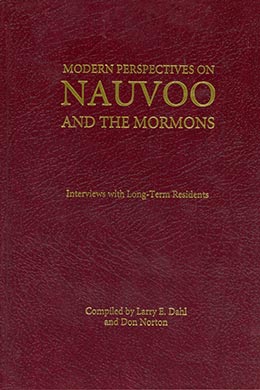The Editors' Role
Don Norton
Larry E. Dahl and Don Norton, comps., Modern Perspectives on Nauvoo and the Mormons (Provo, UT: Religious Studies Center, Brigham Young University, 2003), xi-xii.
Oral histories are valuable mainly because they represent history that otherwise might never be recorded. Were it not for the tape recorder, the interest of Professor Larry Dahl, and students in BYU’s Semester at Nauvoo program, the views of residents of Nauvoo—those perhaps most immediately affected by the return of Latter-day Saints to Nauvoo and the construction of the Nauvoo Temple—might never have been preserved for historians or posterity.
As an active oral historian, I was invited to supervise three phases of the project: (1) help train the students to do effective interviews, (2) guide the students through the transcription process, and (3) do a final edit of the transcribed interviews to ensure consistency in style.
At the beginning of the project, Larry Dahl and I composed a set of questions the students would pose, either directly or indirectly, to informants (see appendix). The students also received a set of interview guidelines regarding the use of the recording equipment and some suggestions on effective interview techniques.
In late October 2001,1 traveled to Nauvoo to work with the students on the transcription phase. Each student was to have transcribed a minimum five pages of one of his or her interviews. Some students had transcribed entire interviews. The students and I met in workshops and worked together individually.
A word about transcription: Some professional oral historians recommend verbatim transcription—a standard practice in early oral history work and still the practice in some kinds of oral history work. In recent years the trend has been toward light editing, and this is the practice we followed. To retain an authentic voice and enhance readability, while capturing all information, we eliminated many incidental words and obviousrepetitions; we combined some brief sentences and rearranged others (to improve logical flow); but we rarely changed basic wording. We made every attempt to capture and retain the voice and intended meaning of informants. All published interviews have been reviewed and approved by the informants, who also signed release forms.
I personally edited all interviews before they were sent for approval by the informants. All revisions by the informants were later incorporated into the final draft.
Oral history was a new experience for most of the students who worked on the project. Their inexperience may be evident in places, yet their enthusiastic labor nevertheless has resulted in a significant body of information on one of the more critical and sensitive moments in the history of the Church.
I wish personally to extend thanks to Larry Dahl for inviting me to help with the project; to the students for their work and enthusiasm; to Dianna Douglas, a BYU student who brought consistency to the format of the final draft; and especially to Nauvoo residents for their interest and honesty in talking to the students.
Don Norton
Department of Linguistics and English Language
Brigham Young University
Students Participating in the Interviews
Debbie Ludwig
Mandy Murphy
Joel la Peterson
Amy Redd
Jessica Smith
Heidi Tice
Andrew Wahlstrom
Jordan Whiting
Taio Barnes
Jedediah Briggs
Cara Cahoon
Tyler Dahl
Jayson Edwards
Libby Hanks
Diana Johnson
Jeff Johnson
Adam Layton
